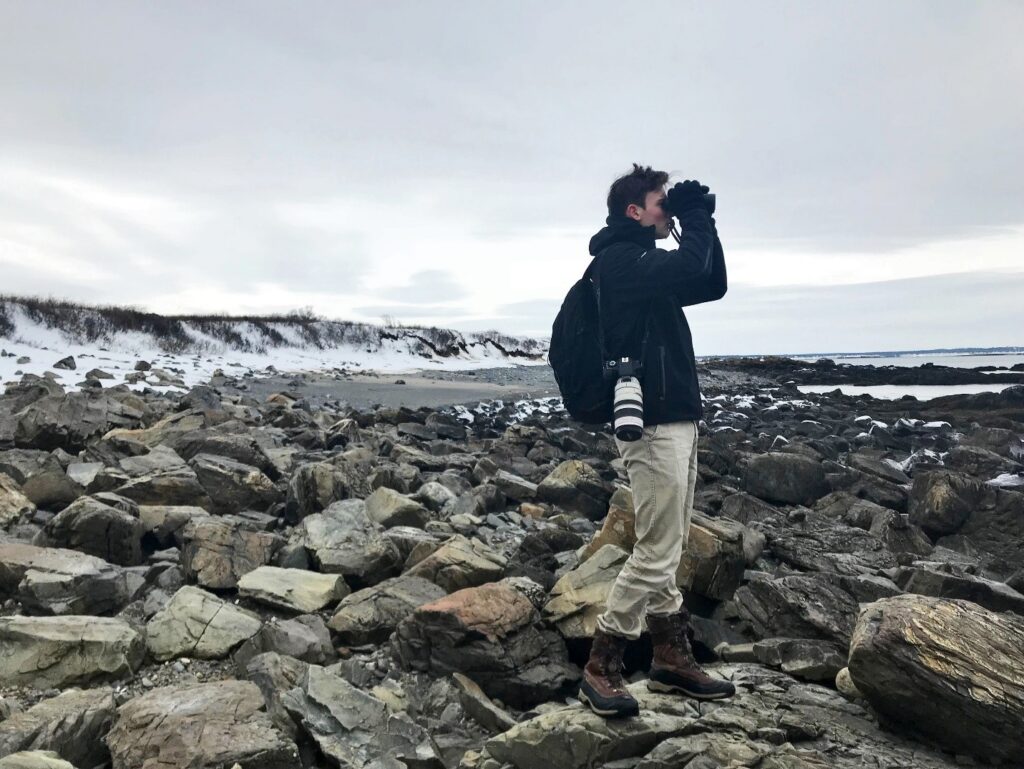Xander Vitarelli, Environmental Science 2022′

Why do I bird? I’m asked this every time I reveal my hobby to someone new. Naturally, this is the first thing that comes to their mind. There’s nothing inherently “cool” about the practice, nor any money or fame to drive success. Even so, year after year I find myself immersed in the natural world, searching for every bird I can get my binoculars on.
Though I will never fully be able to communicate the true reason, I primarily bird out of intense fascination. From when my grandfather first identified feeder birds for me, to my teenage years birding Central Park, my fascination has only grown. This inherent fascination has led me to look at birds in many different ways, most of which I had not realized existed until I came to UNE.
My interest in birds stems from my grandfather pointing out various birds who came to his feeders. Combining this little bird knowledge with my dad’s new camera, I developed a passion for wildlife photography. At 10 years old, I was walking for hours in the “woods” of Central Park, always carrying a fishing pole and camera. On one of these walks, I came across a man holding up binoculars. When I asked him what he was looking at, he pointed to a small bird fliting high in the canopy, a warbler. Unbeknownst to either of us, that simple act of pointing out a bird changed the course of my life. The next day, binoculars joined the camera in the backpack.
From then on, the fascination with birds only grew. At a young age, I learned that nature is everywhere, one just has to know what they’re looking for. I slowly found a community that I had not known to exist: the birding community. As I met more birders, my focus began to narrow. I started to actively seek out birds. Finding the first Pine Warbler of Spring was suddenly a huge deal for me. I stopped my high school cross country team on runs to observe a Canvasback in the Hudson River.
Through various connections (and very supportive parents), my passion for birding landed me face to face with ornithologist Helen Hays. Hays heads a 50+ year study on Common and Roseate Terns. She invited me to the study site, a 17-acre island in the Long Island Sound called Great Gull Island (GGI). At the age of 14, I was actively participating in scientific research, banding terns during the summer, and volunteering to input data at the GGI office during winter break. With a good knowledge of birding paired with three summers of research, I felt that I was at the top of my game. Then I came to UNE.
College has allowed my birding habits to run unchecked, especially now with hybridized classes. With no one to hold me accountable, I find myself calling into Zoom classes at East Point, attending lectures while scanning for alcids (seabirds). I credit this “obsession” with birding to my friend Harry Wales. Harry showed me a different side to birding, which has been quite humbling. He mentored me in shorebird birding (and sharped my skills in all other aspects), a huge boost to my birding confidence. In return, I have helped him explore photography, constantly badgering him to bring his camera to school (which finally happened this semester).
Harry matches if not exceeds my energy when it comes to chasing rarities. Our most famous chase thus far occurred last semester, when we woke up at 4:00 a.m. to drive from Maine to Rhode Island to see a Common Cuckoo (third record ever of the European species in the lower 48). We twitched this bird and still made it back for Ecology at noon.
Charging headfirst into a vortex of knowledge, I have started to take in all forms of birding. As president of UNE’s Birding Club, I am organizing charity big days (a 24-hour birding blitz), “learn to bird” events, and working the logistics of a World Series of Birding attempt. I find myself ranting about birds in any setting, whether that be class, cross country practice, or hanging out with friends. Many of these rants have led to impromptu birding trips with non-birding friends, although those friends soon become converts.
Predictably, my initiate fascination with birds is ever growing. While I now record everything I see, chase any rarity that flies within state boundaries, I have also begun to observe birds on a more individual level. I find myself studying their behaviors, seeing them less as numbers for the year, yet for what they are: amazingly evolved creatures that if taken the time to observe, have a lot to offer humanity.
